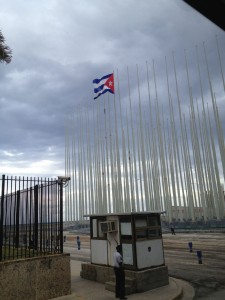 “You can ‘Google’ it,” our main Cuban tour guide Erik often stated after sharing a factoid about his country.
“You can ‘Google’ it,” our main Cuban tour guide Erik often stated after sharing a factoid about his country.
Erik and the other Cuban guides were real live search engines—or more appropriately, walking encyclopedias—about Cuban history, traditions and current practices.
(Americans are able to travel to Cuba legally with organizations that have secured a license from the US government for education exchanges. The World Affairs Council sponsored my excellent tour.)
Yet, something seemed off base about Erik’s Google comment, even though he was a shining example of a knowledge worker. (By the way, the names of Erik and Tanya, another younger guide, showed the influence of the Eastern Bloc on Cuba.)
It wasn’t just the timing of the comment. Erik and we knew we couldn’t “Google” anything while we were traveling on the tour bus or walking around Havana or the countryside.
As Americans traveling in Cuba, we didn’t have the immediate Internet access that we all have become accustomed to.
(Because of the US trade embargo with Cuba, cell phone service from US carriers is not available in Cuba. Americans can access the Internet legally only by buying access to Wi-Fi signals at our hotels for an hour at a time. To talk on a cell phone, Americans must use an unlocked phone and get a special SIM card in Cuba.)
Then several days into our trip I realized that Erik couldn’t easily “Google” anything either! He along with his fellow 11.2 million Cubans are without Internet access most of their waking hours—unless they are university professors or in another privileged position.
Erik revealed this particular factoid in response to my question about online learning. As he was talking about the importance of education in Cuba—which is free for college, including professional schools—I innocently asked whether many Cubans were taking advantage of MOOCs, the massive open online courses.
(Earlier this fall, I and thousands of others around the world took Coursera’s Gamification certificate class offered through The Wharton School, University of Pennsylvania. MOOCs seem an ideal option for a poor, yet highly-educated island country that values education for the masses as well as easy access to other social services.)
Taking an online course would be a major time and cost commitment for Cubans—even if it were legal. Erik explained that it’s against the law for Cubans to subscribe to Internet service.
If Cubans want to access the Internet, they also must go to a hotel and pay by the hour. The hourly rate is the same amount that tourists pay, which is a significant percentage of a Cuban’s monthly salary.
For the past two years, Cubans can legally have cell phones. But they are basic models compared to the smartphones that are growing in popularity all across the world. And cell phones are too pricey for many Cuban citizens.
This government-imposed Internet information diet is ironic—yet not shocking—once you consider the context. The Castro-led revolution in the late 1950s totally transformed Cuba into a socialist state, reforming the country socially and economically.
The massive education and health care reforms improved people’s quality of life starting in the 1960s. Yet the country’s economic performance has been erratic and unstable, especially after the collapse of the Soviet Union, which provided substantial economic and military aid.
Meanwhile, the many Cubans who stayed in the country and embraced Castro’s revolution have missed out on another revolution: the information revolution.
For many years now, the rest of us around the world have been experiencing advancements in technology coupled with globalization. Yes, this revolution has caused massive disruptions yet it also has created many positives that have become interwoven into the fabric of our daily lives.
We enjoy the right to either inexpensive or free information, as well as easy access.
As a result—especially for those of us in first world counties—we run the risk of suffering information obesity. (In my last blog post, Deal with, not heal, FOMO, I wrote about having to give up the Internet for my week in Cuba.)
But more information is better than little, no or censored information, especially for knowledge workers. Information is oxygen.
During one of our lectures with an esteemed Cuban economics professor, I pointedly asked whether Cuba’s commitment to easy access to social services included free access to information.
In his answer, he divided information into two parts. The controlled, static type (traditional education and books) is free and easy to access. Yet, the dynamic type of information that we expect with technology is extremely expensive and difficult to use.
So it’s not surprising, that “Radio Bemba”—the rumor mill—remains a powerful way for Cubans to share information.
Compared to Facebook, Twitter and other social media tools, though, Radio Bemba is slow, inconsistent and limited in its breadth of material.
While I had a fabulous time in Cuba, I was glad to return to the United States and power up my smartphone and all my apps. Give me life, liberty, the pursuit of happiness and access to information!
Can you imagine living and working without the Internet?

0 Comments